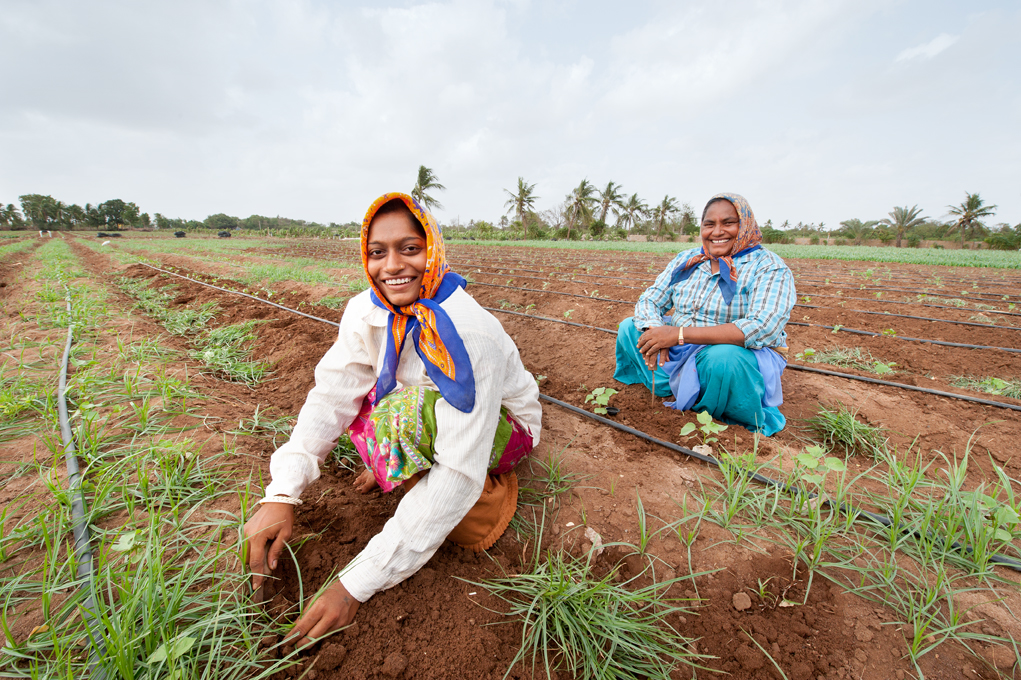The context
Green Climate Fund (GCF) is the world’s largest climate fund, mandated to support developing countries to raise and realise their Nationally Determined Contributions (NDCs) - ambitions towards low-emissions and climate-resilient pathways.
In contrast, limiting global warming to 1.5°C is still just possible and will be determined by the investment decisions made by countries, industries, and individuals over the next decade.
Being an island nation, Sri Lanka’s high temperatures, unique and complex hydrological regime, and exposure to extreme climate events make it highly vulnerable to climate change. The prolonged extreme heat conditions also deteriorate human health and living standards, particularly for outdoor laborers. The temperature rise is likely to put downward pressure on agricultural yields, mainly on the staple food, rice, which can negatively impact on the household food security. The increase in frequency and intensity of precipitation in recent past, brought lives, livelihoods, and infrastructure at risk through their link with riverine flooding, flash floods, and landslides exacerbating poverty and inequality in the country (World Bank Group, Asian Development Bank, 2020). Limited capacity to access the climate finance is a major problem for the country as much as it is required to develop a country-wide climate resilience, particularly through water-related entry points.
Direct Access Entities (DAEs) are sub-national, national, or regional organisations that are nominated by the National Designated Authority (NDA), which in Sri Lanka is the Ministry of Environment (Environment, 2021). The GCF accredited DAEs are eligible to receive readiness support, so that fit-for-purpose DAEs may be available to develop priority project ideas, access GCF resources, and eventually implement countrywide climate resilient projects aligned to the Country Programme.
The barrier analysis workshop and needs assessments conducted targeting the potential DAEs highlighted the lack of standalone climate smart gender policy as their last hurdle that delays advancing the GCF accreditation process. A severe lack of human resources at the NDA in terms of time and capacity to support the nominated DAEs in developing the requisite policy and corresponding, both of which are non-conventional from their current banking operations is the next challenge for these banks to gather required knowledge in order to complete their applications. This resulted Sri Lanka to satisfy with only one GCF accredited DAE, the DFCC Bank PLC. so far out of five banks nominated by the NDA.
GWP contribution
In 2021, GWP launched the 2nd Readiness Project titled Strengthening the capacity of Direct Access Entities (DAEs), NDA and GCF project programming stakeholders in Sri Lanka to access climate finance through enhanced strategic frameworks for stakeholder engagement and a strengthened project pipeline. As the Deliver Partner, GWP South Asia (Regional Water Partnership) is thus responsible for the substantive implementation of on-ground activities including support for Direct Access applicants to develop the required Gender Policy posed the last remaining hurdle for the banks to advance their GCF accreditation.
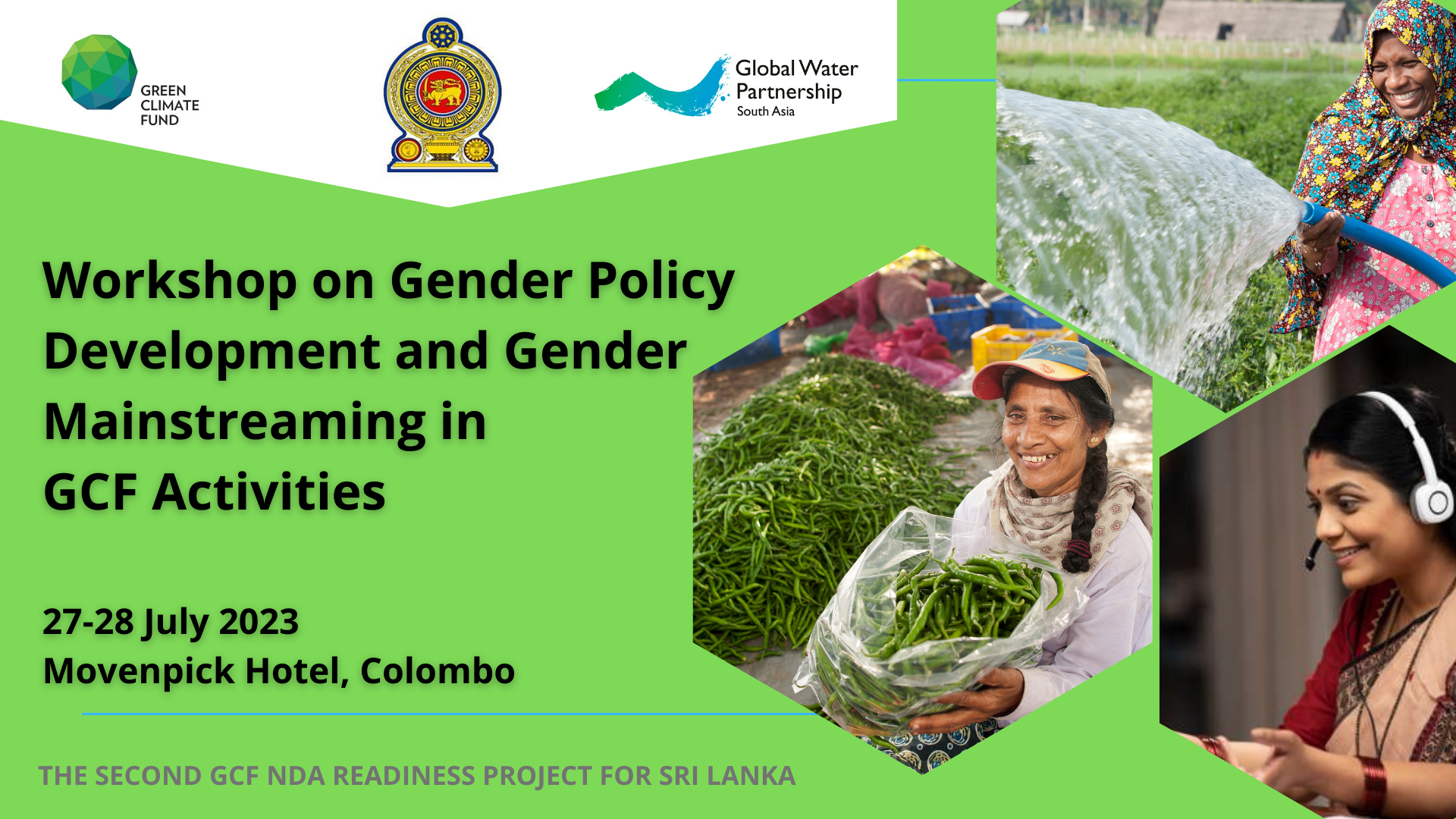 To help the banks in their endeavors, a two-day Gender Policy Development Workshop was held in Colombo on 27 and 28 July 2023. Fifteen participants including staff of the Human Resources Divisions of the potential DAEs and the representatives from NDA attended the workshop, with the objective to enhance their capacity in gender policy development and mainstreaming across the project cycle. During the workshop, they learnt about the essential components for developing a gender policy. This knowledge empowered prospective DAEs, especially those in the banking sector, to recognise the gaps in existing gender policies and prepare the respective gender policies to meet GCF standards for accreditation. Additionally, the workshop cultivated an awareness of the significance of gender mainstreaming in projects funded by the GCF, equipping participants with the necessary information to enhance gender mainstreaming in similar initiatives and an understanding of the crucial connection between gender equity and climate change adaptation and mitigation. Local consultants who managed the workshop played a vital role and added a nuanced understanding especially of the country's context.
To help the banks in their endeavors, a two-day Gender Policy Development Workshop was held in Colombo on 27 and 28 July 2023. Fifteen participants including staff of the Human Resources Divisions of the potential DAEs and the representatives from NDA attended the workshop, with the objective to enhance their capacity in gender policy development and mainstreaming across the project cycle. During the workshop, they learnt about the essential components for developing a gender policy. This knowledge empowered prospective DAEs, especially those in the banking sector, to recognise the gaps in existing gender policies and prepare the respective gender policies to meet GCF standards for accreditation. Additionally, the workshop cultivated an awareness of the significance of gender mainstreaming in projects funded by the GCF, equipping participants with the necessary information to enhance gender mainstreaming in similar initiatives and an understanding of the crucial connection between gender equity and climate change adaptation and mitigation. Local consultants who managed the workshop played a vital role and added a nuanced understanding especially of the country's context. 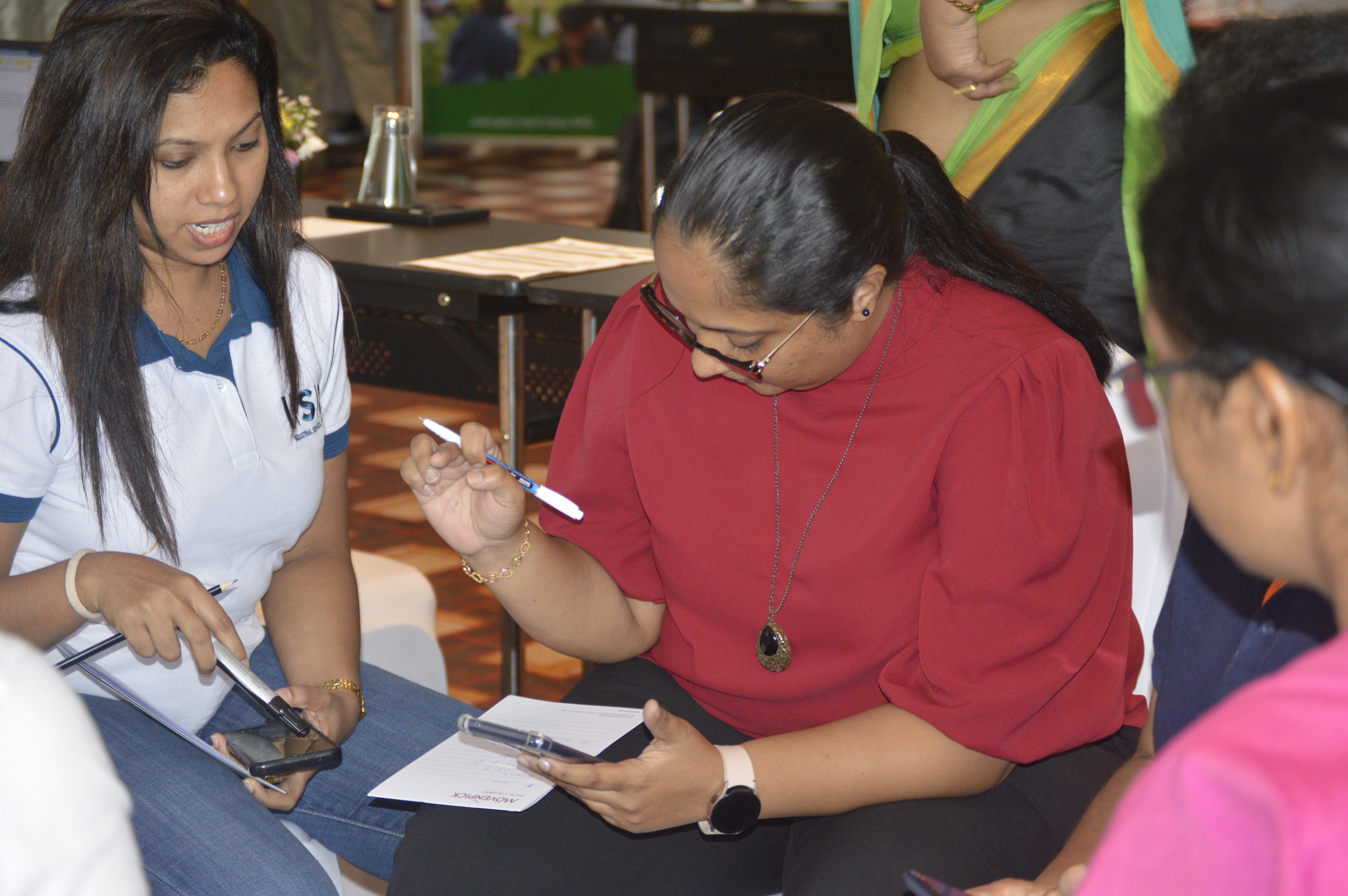
Results
As lack of a standalone climate smart gender policy was the barrier that delayed the banks’ submitting their applications for DAE accreditation, the knowledge gathered through the workshop allowed participants to subsequently develop and validate the respective gender policies. Thus, two leading Sri Lankan private banks (pipeline DAE) have been able to submit their GCF applications before the end of 2023, and the third bank is at the last lap. Overall, all the designated DAEs have significantly advanced in the process of accessing climate funds.
Based on the feedback, it was evident that the workshop was found highly informative and educational by the participants. Many of the participants were unfamiliar with the topic of gender, particularly the connection between gender and climate change related challenges and the importance of establishing concrete gender policies in climate financing and mobilising international funding. The workshop thus revealed the relationship, enabling the participants to engage more effectively in future GCF activities. As one participant put it, “our current gender policy doesn't necessarily discuss the impact of climate change, but through the workshop we learnt to mainstream gender considerations in climate policies and plans.”
“The most prominent outcome is that now with the awareness of gender mainstreaming in climate change adaptation, we started considering the proposals submitted by the clients which we neglected in the past. Although we have still not implemented the gender policy, we tend to consider the level of gender inclusivity in the client projects, we try to understand whether the client provide equal opportunities for people, irrespective of gender, whether the female employees are provided with adequate facilities including the leave for maternity care.”
The session on gender mainstreaming was particularly insightful, as it provided the participants with an understanding of how gender elements could be integrated into the institutional policies and guidelines. They further discovered that many of the gender concepts are already present in various forms of documents related to banking operations. The workshop served as a platform to explore and gather the necessary elements for such a policy. As such, they gained insights on how to develop a gender policy that is comprehensive, effective, and aligned with industry standards.
Since then, the NDA has in collaboration with GWP decided to establish a Help desk, where staff from the Climate Change Secretariat will be trained specifically to help the potential DAEs in the accreditation application process.
Lessons learnt
Most importantly, understanding the potential DAEs and their perspective is of essence to the process of unlocking the doors to climate funding. A team member from the Project Management Unit (PMU) noted that at the initial stage, the potential DAEs were difficult to persuade to enter the process. The process is very long and cumbersome and takes a lot of effort for the banks, including at least one dedicated and qualified staff-member to make the process run smoothly. If handled effectively, the process may take 2-3 years instead of 5-6 years. To ease the application process, the PMU has continuously followed up and answered questions raised by the banks atleast once a week after the workshop until submissions. 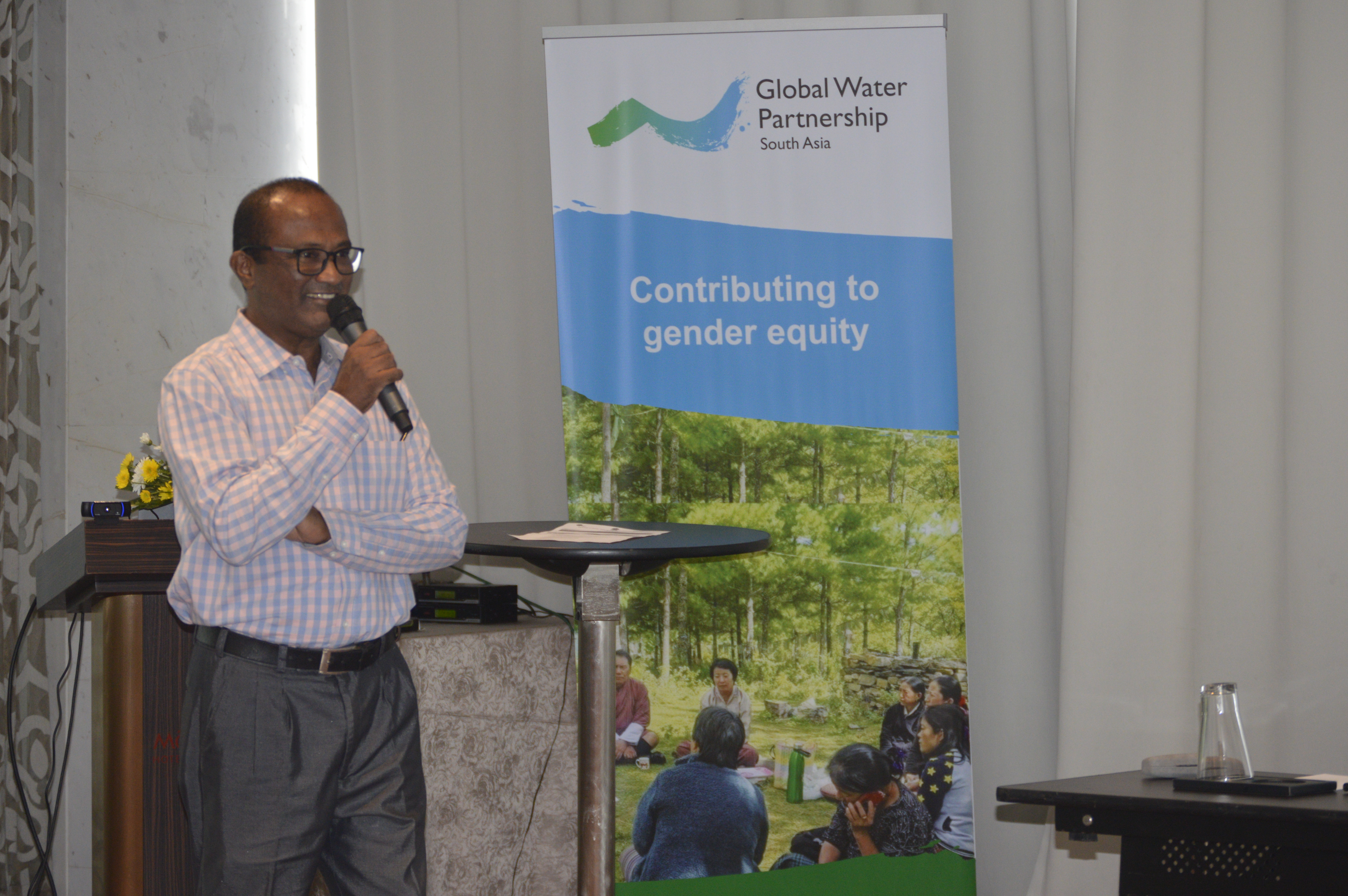
“Whereas sharing examples of policies and other internal documents especially for the purpose of training is unproblematic in other sectors, which is prohibited in the banking industry. Therefore, sharing and learning from each other’s policy documents was not an option at the Gender Policy Workshop. To begin with, this was a big challenge for the trainers, who had to work around it in various ways, as they could not provide direct feedback on documents they could not see.” He further stated that “one way to get around this was to engage a resource person from the accredited DFCC Bank, who could share their experiences from the application process without having to reveal any internal documents. Another way was to create a more generic template for the gender policy according to GCF requirements, which would help the banks to structure their document”.
Most of the staff dedicated to the GCF accreditation process come from environmental science, management, engineering, biology, finance, and economics backgrounds, and none of them studied social sciences. While some of them have been exposed to questions of gender equality through their previous work and through existing HR policies at their workplace, the connection between gender and climate change was still a new and challenging link to make, especially when it comes to assessing potential projects to invest in. The GCF accreditation process helped the banks push for gender policies, and so did the training workshop, which importantly offered free of charge to the bank staff. “The training programme came in at the right time, which was a great opportunity for us to get the required knowledge and exposure to this area. If not for the workshop, we must hire a consultant at a cost.”
Participants have also shared their opinion about having local instructors and consultants to facilitate the workshop. “The local consultants are fully aware of the country. That encouraged us to discuss issues freely and to understand potential remedies rather than having foreign consultants.”
Implementation of the gender policies, both internally in the banks’ and externally in the projects will eventually help funding but was seen as the most pressuring challenge by the workshop participants, who asked for future support and ‘handholding’. The challenge of implementation into one’s own organisation beyond policy formulation and into practices of implementing as well as monitoring was illustrated by a participant, “It requires some time to get the commitment of the departments of the Bank, because it's not just our commitment but all the staff should drive this process. It is not just developing the project management policies but incorporating the concept into actual projects and their monitoring and evaluation. So, taking this into the real work scope will be the main challenge.”
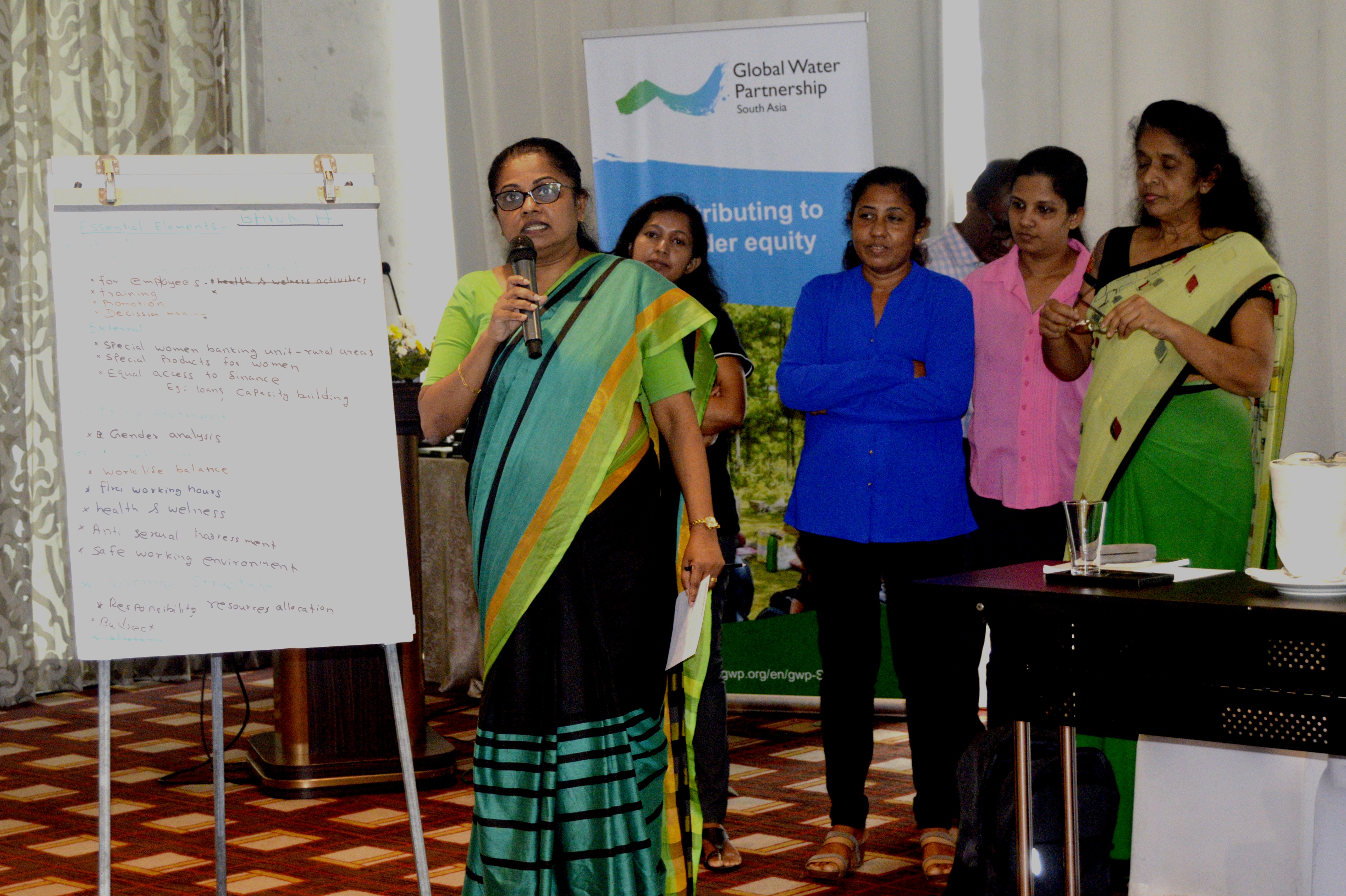
Commenting on the implementation phase, another participant emphasised the importance of both internal and external communication to effectively carry out the gender policy in banks. “The bank should involve a lot of marketing around the new gender policy because this new addition has to be communicated with stakeholders and the affected parties, so that they know something new is there.” The implementation phase may be internal and to some extent external could be overcome through communication strategies. However, some structural features of the market and society are out of the hands of the banks and need intervention from government regulators.
References
Environment, T. M. (2021). Operation manual for Green Climate Fund (GCF) for Sri Lanka (Version 1) . Colombo: Government of Sri Lanka .
World Bank Group, Asian Development Bank. (2020). Climate Risk Country Profile: Sri Lanka. Washington: World Bank Publications.
